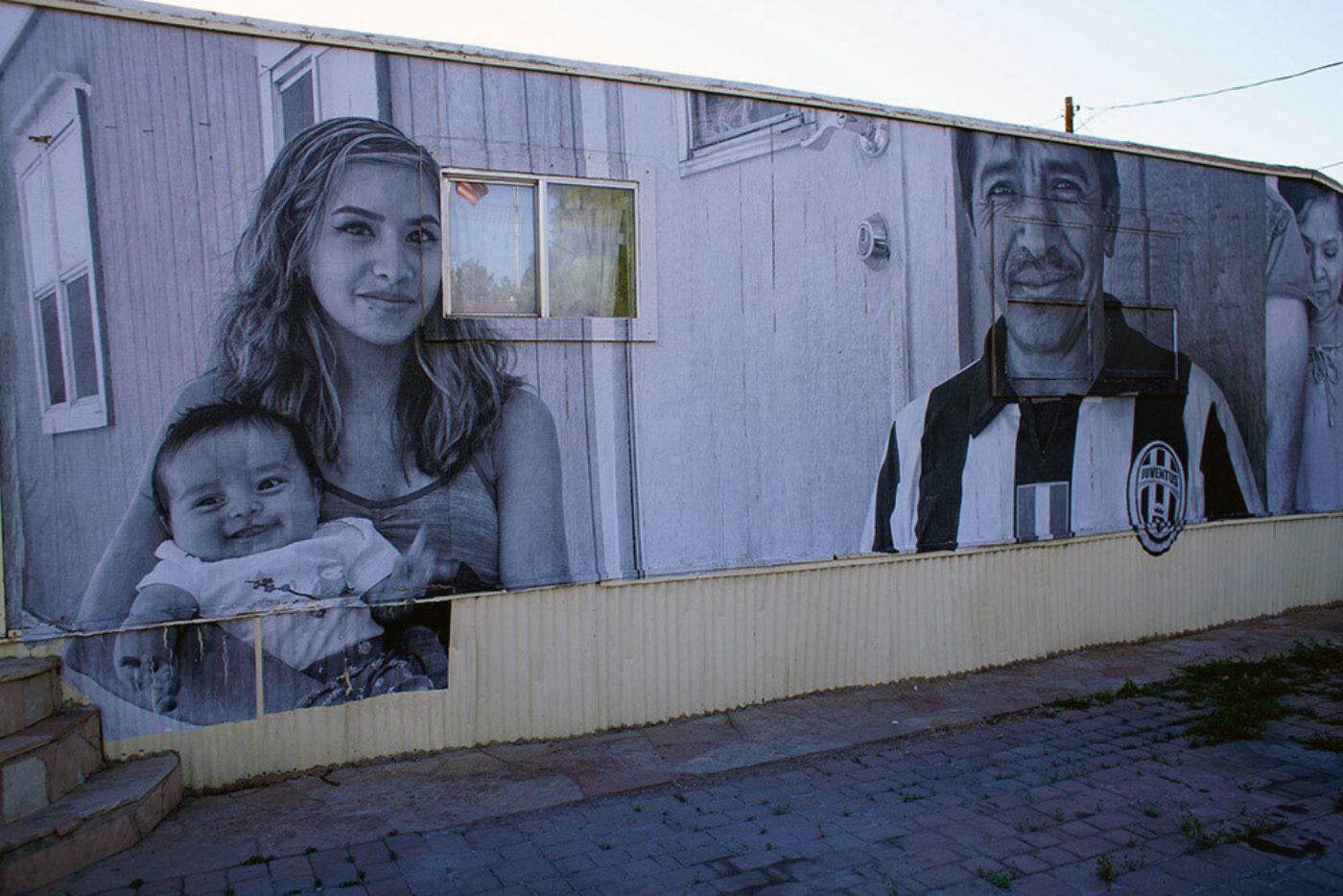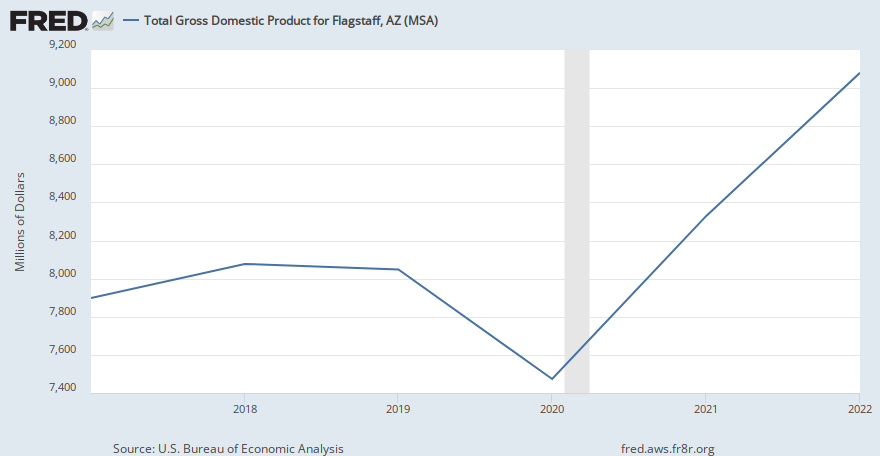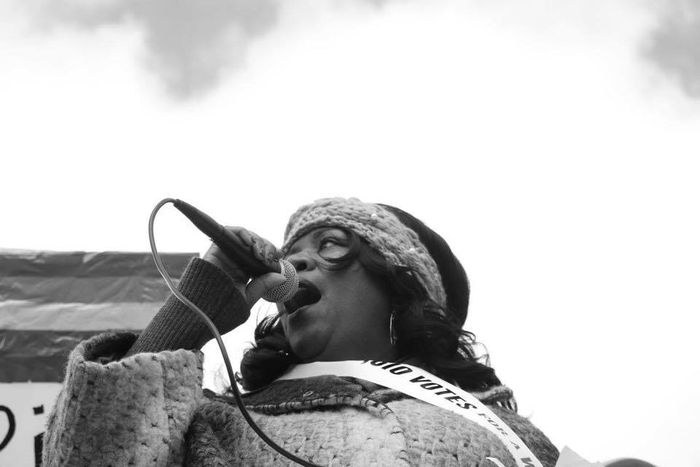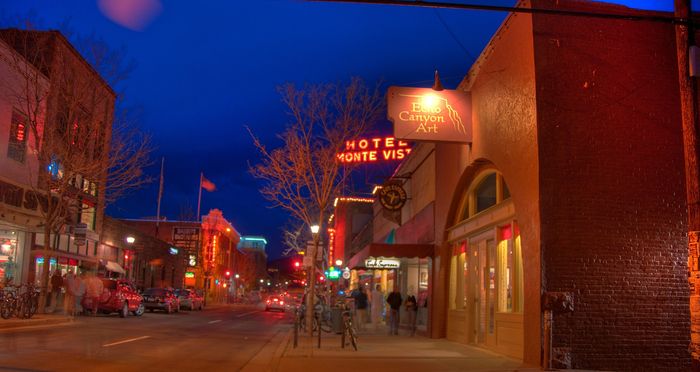Introduction
“Poverty with a view” is the phrase often used to describe the housing situation in Flagstaff. According to a recent study, “Flagstaff’s cost of living is 14.1% above the national average, driven by housing costs 36% above the national average” (ECoNA). Further, “43% of households (which includes renters) in Flagstaff are cost burdened and put more than 30% of their incomes towards housing” (ECoNA). This is particularly true for renters, who have seen their costs increase significantly while homeowner’s costs “decreased dramatically” (ECoNA). The result is that a large percentage of people in Flagstaff have so much trouble affording life in Flagstaff that they are pushed out of the town and move to a city with more affordable housing and better economic prospects.

I would like to think about what these issues mean for us as free beings. I believe that reflecting on the importance of housing can teach us something about freedom and how we can achieve it. Conversely, by reflecting on the nature of freedom, we can, in turn, come to appreciate the importance of affordable housing. In the following essay, I will briefly detail some of the major forces at play in our local housing market. Then, I will turn to the concept of freedom, looking at some of the ways that we tend to think about it, and how we might move beyond some of the inadequate ways that we have of thinking about freedom. Finally, we will turn to housing to reflect on how important it is to have secure and affordable housing in order to live a free life.
Some forces at play
Capital
Perhaps the most obvious force at play in the housing market is capital. Karl Marx’s Capital is one of the most significant analyses on capitalism that we have on record. In “The General Formula for Capital”, he discusses two very basic cycles for the circulation of money (M) and commodities (C). In one cycle, the “C-M-C,” where a commodity is sold for money, and then that money is exchanged for more commodities, he refers to as “selling in order to buy.” In this case, we might sell something we have made from our own labor for money, and then in turn use that money to pay for housing, food, education, medicine, and so on. This is where most of us find ourselves. The other cycle, “M-C-M”, is the movement of capital, where one uses money to buy some commodity and then in turn sells this for money. He calls this “buying in order to sell”. It would be “absurd”, Marx says, to buy a commodity and sell it for the same price or less. It would just pointlessly repeat the same process over and over. The only way capital investment makes sense, of course, is if we make money. The actions of the individual investor follow this simple, core logic of capital investment and, as a result, they themselves become a function of the laws of capital accumulation. Marx writes,
As the conscious representative of this movement, the possessor of money becomes a capitalist. His person, or rather his pocket, is the point from which the money starts and to which it returns. The expansion of value, which is the objective basis or main-spring of the circulation of M-C-M, becomes his subjective aim, and it is only in so far as the appropriation of ever more and more wealth in the abstract becomes the sole motive of their operations, that they function as a capitalist, that is, as capital personified and endowed with consciousness and a will. Use-values must therefore never be looked upon as the real aim of the capitalist; neither must the profit on any single transaction. The restless never-ending process of profit-making alone is what he aims at.
Investing in housing is unique insofar as the commodity purchased is someone’s home. A short personal story may help to illustrate this. A few years ago, I lived in a small run-down former liquor store that was turned into a small house. This house was purchased, by their account on a whim, by what I take to be two “nice” people, people who were not in any overt way evil greedy villains. Nevertheless, what they did was purchase an investment with capital, and so they were involved in a logic that frames the situation in a way that is indifferent to the personalities or situations of the people involved. When they bought this home that I was renting, they first assured me that they would not kick me out. We even spoke of what we could do with the property, including ideas for a small community garden. However, since they made an investment, and were following the logic of capital investment, it only made sense to try to make a profit, and as much profit as possible. The result was that about 6 months later I received a letter telling me that I had 30 days to vacate the property. I never saw them again. In time they turned the property into two apartments, one of which is now used exclusively for vacation rentals.
The point of this story is not to demonize people who buy homes, hotels, or rental property. What Marx helps us to see is that when we’re following the logic of capital investment, we function as “a conscious representative of this movement” and not just a person with particular interests in how to make a living or what to do with their surplus capital. What is important is to see the logic involved when capital investment is one of, or perhaps the driving force, in one’s housing market. The result of this kind of social-economic interaction is to pit owner’s against renters. If the aim of owners or investors is to get a good return on their investment, but the interest of those living in their investment property is to have a home that they can afford, their interests are in the kind of conflict that strikes at the core of one’s feeling of security and overall well-being.
Tourism
Over five million people visit Flagstaff each year, bringing almost 750 million dollars into the area. A given party spends an estimated $589 dollars per day, or almost 215,000 per year. Meanwhile, the median family income is about $48,000. This means that the purchasing power of a visiting group far exceeds that of the average resident. The effect that this has on housing is significant. One major recent effect of this is in the vacation home rental market. This has often been falsely understood as a way for people to make extra money by renting out their homes or garages. However, the reality of these types of homes is different than we sometimes think. Most of these are properties that are used exclusively as short-term rentals. They are not people just trying to get by by renting out a spare room. These are unregulated hotels in neighborhoods financed by those with the ability to purchase multiple homes. These homes bypass city codes (with help from the state that prevents municipalities from regulating them) and allow what used to be residential zones to be mixed residential and commercial areas. The effect that this has on a neighborhood and housing prices is significant.
(Other) Second Homes
Flagstaff is situated in a beautiful area with great weather and sunshine for most of the year. Nearby Phoenix has almost 5 million inhabitants, making Flagstaff an escape from the heat in the summer as well as a chance to visit a snowy mountain town in the winter for sledding, skiing, and other winter activities. A 2010 study identified roughly 25% of the homes in Flagstaff as second homes. The income of an average home-buyer buying a second home is $197,400 while those buying a primary home is about $74,000.
Student population
NAU students make up about a third of Flagstaff’s population and are the largest driver of population growth. Since 2007, there has been an increase of over 8,000 students in Flagstaff. Northern Arizona University has over 22,000 students who live on its Mountain Campus in Flagstaff. Of those, 41% live on campus. The perception is often that NAU is “taking over” the town with its “irresponsible growth”, though it is actually in the top 1% of colleges in the US for on-campus student housing and is particularly good for a college of its size. Nevertheless, this can still leave over 10,000 students who need to find housing in the community. Further, the Flagstaff mountain campus is bordered by two highways, a cemetery, and downtown. It is difficult to expand the campus. This, of course, has a significant impact on housing in Flagstaff and affects the character of housing and the living communities in Flagstaff, particularly those near the university.
What supports the price of housing?
One distinction that we can make with respect to the different types of housing that we see in Flagstaff is between those whose housing is supported by local wages and those whose housing is not. Tourism and student housing make Flagstaff a popular choice for investors looking to make money. While investing in second-homes seems to have become a hobby for many with the means in Flagstaff, there are also many out-of-town investors who are putting their capital to work in the Flagstaff housing market. In addition to these investors, tourists, most students, and retirees are not relying on local wages for their housing. This leaves a group of people who work and live in Flagstaff and who need to be able to support themselves with the wages they earn here. This is not a small group, but it is clear that this group does not define the housing situation in Flagstaff. They are often out-bid by those who are not dependent on local wages for their needs. Thus, particularly for those working in Flagstaff, it does end up being poverty with a view.
This very brief overview of some of the major forces at play in Flagstaff’s housing market is intended to remind us of some of the major forces and play and the different actors involved in the housing market. We will now turn to the concept of freedom, first looking at some major distinctions between how we might go about defining it.
Freedom
In order to understand how the housing market affects our ability to be free, let’s first look at some of the ways that we commonly think about freedom. Most commonly, when we talk about freedom, we refer to it “negatively,” as philosophers often say. I am free, we might say, if nothing in the external world is preventing me from doing whatever it is that I want to do. In other words, freedom requires an “absence of restraint.” There are good reasons to think about freedom in this way since there are some very obvious cases of oppression where removing restrictions would increase one’s freedom and well-being. If one is literally in chains, enslaved, held against one’s will in a way that has nothing to do with a concern for their freedom, emancipation from these restrictions will generally result in greater freedom. There are also, and have been, many laws that restrict people from doing any number of things: voting, attending school, becoming literate, marrying whomever they wish, etc. Again, we generally expect that removing these laws means the emancipation of those who were restrained by them.
With respect to housing, this way of thinking about freedom would aim at the removal of any kind of restraint. City codes, like zoning laws for example, restrict who can buy what kind of property and what they can do with it: how high one can build, whether they can open a business in their home, etc. They tell us what we are allowed to do with our own property and what options are restricted from our “free” choice. Another restriction would be bank regulations. There are restrictions governing who can borrow money and rules that banks are required to follow to determine who gets money and who does not. We might just remind ourselves of the significance of this by recalling the financial crisis of 2008.
Another common way of thinking about freedom is in terms of autonomy. "Autonomy" comes from the Greek words “auto” (self) and “nomos” (rule, law) and means “giving oneself the law” or “self-legislation.” This kind of conception of freedom is more “positive” in that we are talking more about what it is instead of what it isn't. We call the previous way of thinking about freedom “negative” because it only says what should not happen. It focuses on removing barriers, but does not take account of how we would actually make choices and determine ourselves as free beings. When we think about autonomy, we become more sensitive to the difficulties involved in becoming free and what does need to happen in order to be free.
Desires and habits can play a large role here. Regardless of how we think about ourselves, we can recognize a certain division within ourselves. For example, we all have some desires and habits that we fight against. On the one hand, part of us really is these desires and habits that we wish to eliminate, we might say, but we don’t want them to represent who we “really are” and we feel burdened by them, a “slave to one’s desires” as is often said. We can feel unfree or restrained, not because of some external limitation, but because of an internal limitation or struggle that prevents us from being the person that we really want to be. As a result, we tend to want some part of us, a thoughtful part, to be in charge and “legislate” for the parts of us that aren’t quite in line with what our most thoughtful self wants to do and be. A focus on freedom as autonomy can mean focusing on what it is that we want and how we might gain the capacity to achieve this.
With respect to housing, this type of concern could go in a number of directions, depending on what we want to identify as the “true self” to be followed. On the one hand, one could focus on a kind of “authentic self”, in which case one would care about the kind of housing they want, where they want to live, and being able to shape their home however they would like. On the other hand, one could focus on a moral or rational self. In this case, this might involve doing what is right: providing the proper space for oneself and whoever may be living or staying in their home, perhaps acting within certain bounds of how one should act and what is appropriate to buy with one’s money, even considering the community in which one lives. This concern could also be collective. If I identify as a member of a community, a Flagstaffian in this case, the focus may be on how one lives in this community, which may include the type of home or the proper landscaping for this climate, like the use of native plants or those that do not require supplemental water given the scarcity of water in this area.
We can see how this way of thinking about freedom could come into conflict with a negative conception. If I take my free activity to involve pursuing my sense of what’s right or what kind of housing is in accord with my sensibility, this may become intertwined with others’ activity. One particular factor that matters to many in Flagstaff is being able to have a view of the mountain or some of its surrounding natural landscape. On a purely negative view, one might take oneself to be freer to the extent that one could do whatever one wants with one’s land. However, building a tall building will almost always eliminate many people’s view of the mountains. Similarly, many are concerned with the historic character of different neighborhoods, like Plaza Vieja or downtown. What one person does with their home will either maintain or depart from the kind of character that many may value about their neighborhood. Here, we can see how thinking of our freedom in isolation from others fails to capture even very basic issues involved in housing and housing codes. We are, in fact, living lives that intersect with each other. Denying this misses the real lived, concrete character of how we might actualize our freedom.
Though this was a very brief sketch, I take these to be two of the most common ways that we have of thinking about what makes us free. If we value freedom and use it as the value that is to guide our decision-making, both individually and collectively, we will generally appeal to a version of one of these ways of thinking of freedom. Before going further into philosophical conceptions of freedom, let’s look a bit more robustly at the place that housing has in our lives.
Housing and freedom
“Home is a notion that only only nations of the homeless fully appreciate and only the uprooted comprehend” (Wallace Stegner, 1971)
First off, to follow G.K. Chesterton, we can notice that “to the moderately poor, the home is the only place of liberty.” In What’s Wrong with the World, Chesterton aims to counter the idea that homelife and domesticity is dull and mundane while the world outside of the home is the real place for excitement and interesting living. He takes this to be a “rich man’s opinion.” Of the rich person: “His wildest adventure will end in a restaurant, while the yokel’s tamest adventure may end in a police court.” This is all to say that the world looks more like a fun playground when many of the rules don’t really apply to you and you can buy your way out of trouble. If you are not in this position, you are subject to the laws, harassment, and simply the difficulty of existing in many spaces because so much of the commons has been commodified such that without money, it’s difficult to be anywhere. Further, in most of the space that one can occupy, there are norms and rules to follow. In one’s own home, on the other hand, one may be able to live how one wishes, creatively, even strangely: “it is the only place of anarchy.” If we have exclusive rights to our own home, we can close the door and the space is ours. This opens up the possibility of being able to truly relax, be ourselves, and recharge in a way that is difficult or impossible if our space is always subject to other’s interests or invasions. Let’s look, then at the role a home plays in a few different situations.
First, one may not have housing at all. The difficulties involved in this situation are numerous and I don’t expect that I should have to prove this difficulty to anyone. Without a home, one will spend a considerable amount of time and energy having to care for things that those of us with stability in housing take for granted. They will have to keep in mind where they might sleep tonight. Not having a fixed address makes it difficult to do a number of things like get a cell phone, find a job, keep track of medical records, and access social services. It can also make it difficult to find housing at all. There is a considerable amount of labor involved in being without money or a home. We would generally not identify these tasks as what we want our lives to be about; instead, we want to minimize these so that we can pursue the lives that we want.
Here, we can see a genuine limit for the negative conception of freedom. When we think of freedom as purely negative, that is, 'I’m free if nothing is restricting me', it can be difficult for us to push for people in this position. In an abstract legal sense, for example, nothing may be explicitly preventing such a person from doing whatever they want. One might even be able to say, “they are free to do whatever they want.” However, it should not take much critical thought to realize that this is not actually the case. In order to do what one wants, in this case, it will be difficult or impossible to do this without a stable home, a mailing address, a reliable place to sleep, and some access to reliable transportation, among other things.
Second, one may be a renter in an insecure situation. This is the situation for a large number of renters in Flagstaff. Since Arizona has few laws protecting renters, one can be kicked out when the terms of the lease are done (for instance, to make way for a vacation rental) or one can be pushed out more passively because of rent increases or because property has not been maintained and living there becomes untenable. According to the ECoNA study, “renters as a whole are approximately two times more likely than homeowners to be cost burdened. Because rents increased while home prices decreased for part of the last decade, cost burdens on renters increased slightly while on owners decreased dramatically.” Further, “54.6% of respondents are considering leaving Flagstaff because of housing costs and only slightly fewer (43.6%) plan to leave “in the next few years. Of the cohort that is considering leaving, a large majority (67.8%) are renter households.” This situation is another where one may not feel like their home is really theirs. It can feel more like a long-term hotel stay, where, while it provides refuge and a certain degree of reliability, one will not invest much time in living there. If I’m not able to think past a handful of months, I will be less likely to invest time into making the place feel like mine and reflect the kind of life that I want to live. This is because one has no sense of a future in such a living situation.
In order to live our lives freely, we need to have a future. Many of the things that we want to do with our lives require time and planning, from developing a career and having a family, to becoming a part of the community or developing a social life with meaningful friendships. If we are cut off from these kinds of goods or activities, we will not feel like we can freely live the lives that we want. If one has insecure housing, one never knows if they are going to be around long enough to develop their lives in this way. One will have difficulty committing to the community because it feels like the community is always one step away from pushing them out. I have heard from a number of people new to Flagstaff that they think they are having trouble meeting people because, since so many people leave the city due to the cost of housing or other reasons, those with more stability are hesitant to invest time in new friends who may not be around long.
Third, one may be a house-poor homeowner. Given the lack of laws around renting and its expense, many in Flagstaff will find home ownership more attractive. The result in this case can be quite similar to a renter in an insecure situation. Though you may want to think about your future and how you might plan out the best possible life for yourself and those you care about, you will likely be more immediately burdened with the immediate future. Any change in employment, sudden expenses, or something damaging the home that will need repair can put one’s home in danger. Each month one’s mortgage is due and thus each month is a possibility that one will lose one’s home.
Fourth, one may be a renter in a secure situation. This can be difficult to achieve in Flagstaff because of the few protections that renters are given in Arizona. In this situation, one is freed up from all of the costs and burdens that go with housing insecurity. One has a home, a place for one’s things, and the capacity to think practically about long-term plans with some degree of confidence. When some of these practical matters are taken care of, we are “freed up” to pursue the kinds of things that we want to do with our lives.
Finally, one may be a homeowner in a situation of relative stability. This situation is similar to the renter in a secure situation, with the addition that, in general, this type of housing situation results in the greatest gains in wealth available to the average person. This will end up providing a robust foundation for one's activities, both in terms of the stable foundation out of which one lives, and also because the wealth gained from the typical housing situation is the greatest financial advance the average person makes.
What does this tell us about freedom?
What we see in these different situations is that stable, affordable housing and the ability to cultivate a home of one’s own make it possible for us to pursue the lives we want. A negative conception of freedom can help us recognize certain impediments to housing that will make it difficult for us to live free lives. We generally want to remove any restrictions that would not allow us to rent or buy a home in a certain neighborhood, or do what we wish with our homes. On the other hand, we do in fact often want certain restrictions. We may want to restrict how easily a landlord can increase rent or force us to vacate. We may want to restrict our neighbor’s ability, and our own reciprocally, to make their house a vacation rental. The ability to know our neighbors has an effect on our quality of life and living next to a hotel is just not the same as living next to neighbors that you can know. We may also want to restrict how high a building can be built to ensure that we are still able to appreciate Flagstaff’s beauty. A purely negative conception of freedom fails to recognize that there is much more involved in living freedom than just removing restrictions for individuals.
Though autonomy may rightly consider the divisions within us that make it difficult to live the life that we want, it tends not to consider the external limits that prevent us from living freely. A conception of freedom that focuses on autonomy, on my ability to do what I want, will often fail into some of the same problems. Too often, our conception of freedom is reduced to “I’m free if I get to do whatever I want,” and one’s wants are simply understood to be any immediate desire that I happen to have. However, the housing market is an intersubjective phenomenon. It is not something I do alone but is premised on complex relations with others. A neighborhood is also an intersubjective phenomenon. It is a complex network of relations with others, and not simply what I do alone. Consequently, given that one’s home and neighborhood form an important foundation for our freedom, we need a model of freedom that takes account of the fact that our existence and freedom is rooted in a complex network of relations with others.
Social Freedom
A better way that we can think about freedom is as socially embedded. To think of freedom as “social” is to think of it as the property of a group and not of an individual in some important sense. This is a significant revision of how we think about freedom. Generally, we think of freedom as an individual matter. We focus on removing restrictions for individuals or on the psychological affairs of the individual and how these affect their ability to pursue the life that they want. However, to think of freedom as social means thinking of freedom as something that cannot be done alone.
By examining housing, and its basic connection to freedom and well-being, we see that our freedom is situated within, and constituted by, a network of intersubjective relations, but interpersonal and those embodied in different institutions. We see that, contrary to what is often a feeling that institutions and “government” are simply elements that restrict and oppress us, certain institutions of social reality are in fact the medium and condition for freedom. Banking and housing regulation, city codes, as well as state and federal laws may inhibit us, or may provide a necessary ground out of which we can act as free individuals.
One thing that can help us is to recognize that not every restriction on what we can do is a restriction of our freedom in any meaningful sense. Take friendship, for instance. In order to be in a friendship, I have to both accept a number of limitations, things that I should not do, as well as a number of duties, things that I should do. If I pass a stranger, it makes sense that I say nothing to them. I can even fail to look at them at all. To do this with a friend, however, would be cold and possibly hurtful. I also have to respect certain boundaries and needs that they have for what I can talk about and for how long, etc. I have to recognize them as a person and act within the needs of the relationship that we have established for the good of each as well as the friendship itself. Far from restricting our freedom, it is only within such “confines” that I am able to have a friend in the first place. This meaningful site of my identity and well-being, friendship, is only made possible within a certain set of limitations. These limitations, however, need not be thought of as constraints on freedom. As Hegel says of marriage in the Philosophy of Right (162), “From this point of view, their union is a self-restriction, but in fact it is their liberation, because in it they attain their substantive self-consciousness.” Freedom is found within these self-restrictions, not by removing restrictions at all costs.
This shows us that unless we recognize that freedom is embedded both socially and politically, we will not be able to achieve freedom. Our housing policies and priorities should recognize that one’s home has a significant effect on one’s ability to be free and that a social conception of freedom should guide our policies. Our understanding of freedom should take the lessons learned from thinking about housing, and, whenever possible, avoid the problems of thinking of freedom in an incomplete sense; instead, recognize the social foundation of individual freedom and advocate for the true conditions of freedom.
Sources
Flagstaff second homes nearly double

“American Rent is Due” The Painted Desert Project.By Douglas Miles







